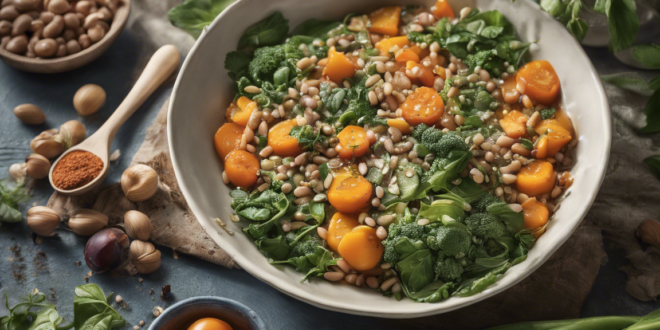Plant-Based Recipes for Beginners: A Comprehensive Guide to Meal Prep and Balanced Nutrition
Embarking on a plant-based diet can be an exciting and transformative journey towards better health, improved wellness, and a more sustainable lifestyle. For many individuals, the transition to plant-based eating might seem overwhelming, but with the right strategies and knowledge, anyone can successfully adopt this nutritious approach to dining. One of the most critical skills for thriving on a plant-based diet is mastering meal preparation, which not only ensures balanced nutrition but also simplifies the cooking process and supports long-term dietary success.
Understanding the Importance of Meal Prep
Meal preparation, or meal prep, is more than just a trendy culinary approach—it’s a strategic method of planning, preparing, and portioning meals in advance. For those exploring plant-based eating, meal prep becomes an essential tool that offers numerous benefits beyond simple convenience. By dedicating a few hours each week to planning and preparing meals, individuals can save time, reduce stress, minimize food waste, and ensure they’re consistently consuming nutritionally balanced dishes.
Key Benefits of Meal Preparation
1. Nutritional Consistency: Meal prep allows you to carefully plan balanced meals that meet your nutritional requirements, ensuring you receive adequate protein, vitamins, minerals, and other essential nutrients from plant-based sources.
2. Time Efficiency: By preparing multiple meals simultaneously, you can significantly reduce daily cooking time, making it easier to maintain a healthy diet even during busy weeks.
3. Cost-Effectiveness: Buying ingredients in bulk and preparing meals at home is often more economical than purchasing pre-made meals or dining out frequently.
4. Portion Control: Pre-portioned meals help manage calorie intake and support weight management goals.
Essential Tools for Successful Meal Preparation
Before diving into plant-based meal prep, it’s crucial to invest in some basic equipment that will streamline your cooking process:
– High-quality food storage containers
– Sharp kitchen knives
– Cutting boards
– Large mixing bowls
– Measuring cups and spoons
– Food processor or blender
– Slow cooker or instant pot
Nutritional Foundations of Plant-Based Meal Prep
Creating balanced plant-based meals requires understanding key nutritional components. Focus on incorporating diverse protein sources, complex carbohydrates, healthy fats, and an abundance of fruits and vegetables. Protein-rich plant foods like legumes, tofu, tempeh, seitan, and quinoa should form the foundation of your meals.
Weekly Meal Prep Strategy
Developing a consistent meal prep routine involves several strategic steps:
1. Plan Your Menu: Choose recipes that share common ingredients to minimize waste and simplify preparation.
2. Create a Shopping List: Based on your planned meals, compile a comprehensive list of required ingredients.
3. Schedule Prep Time: Dedicate 2-3 hours on a less busy day (typically Sunday) for meal preparation.
4. Batch Cook: Prepare large quantities of staple ingredients like grains, beans, and roasted vegetables.
Beginner-Friendly Plant-Based Recipes for Meal Prep
1. Quinoa and Black Bean Power Bowl
– High-protein combination of quinoa and black beans
– Roasted vegetables for added nutrition
– Versatile base that can be customized with different seasonings
2. Chickpea Curry with Brown Rice
– Protein-packed chickpeas
– Nutrient-dense curry sauce
– Easy to prepare in large batches
– Freezer-friendly option
3. Lentil and Vegetable Soup
– Rich in fiber and plant-based protein
– Easily adaptable to seasonal vegetables
– Can be stored for multiple days
Meal Prep Storage and Safety Tips
– Use airtight containers to maintain food quality
– Refrigerate prepared meals and consume within 3-5 days
– Label containers with preparation dates
– Consider freezing portions for longer storage
– Reheat thoroughly before consuming
Common Challenges and Solutions
While transitioning to plant-based meal prep, you might encounter challenges such as:
– Limited cooking skills
– Time constraints
– Flavor monotony
– Nutritional concerns
Overcome these obstacles by:
– Practicing basic cooking techniques
– Starting with simple recipes
– Experimenting with diverse spices and herbs
– Consulting nutritional resources or professionals
Conclusion: Empowering Your Plant-Based Journey
Meal preparation is a powerful strategy for successfully maintaining a plant-based diet. By approaching it systematically, creatively, and with an open mind, you can transform your relationship with food, improve your health, and enjoy delicious, nutritionally balanced meals.
Remember, transitioning to plant-based eating is a personal journey. Be patient with yourself, remain curious, and celebrate each small victory along the way. With consistent practice and a positive attitude, you’ll soon become a confident and skilled plant-based meal prepper.
 Good Calories Guide GoodCalories Guide focuses on nutrition, healthy eating, and overall wellness. The site offers practical insights into evidence-based dietary practices, including tips for specific lifestyles such as veganism, keto, and family-friendly meal planning. It also addresses unique nutritional needs for individuals with conditions like diabetes or food allergies, while providing quick and accessible recipes to make healthy living a sustainable and enjoyable choice.
Good Calories Guide GoodCalories Guide focuses on nutrition, healthy eating, and overall wellness. The site offers practical insights into evidence-based dietary practices, including tips for specific lifestyles such as veganism, keto, and family-friendly meal planning. It also addresses unique nutritional needs for individuals with conditions like diabetes or food allergies, while providing quick and accessible recipes to make healthy living a sustainable and enjoyable choice.


